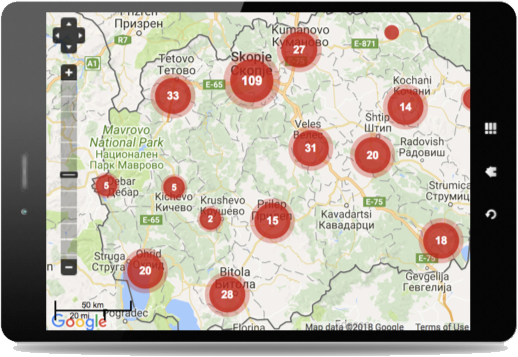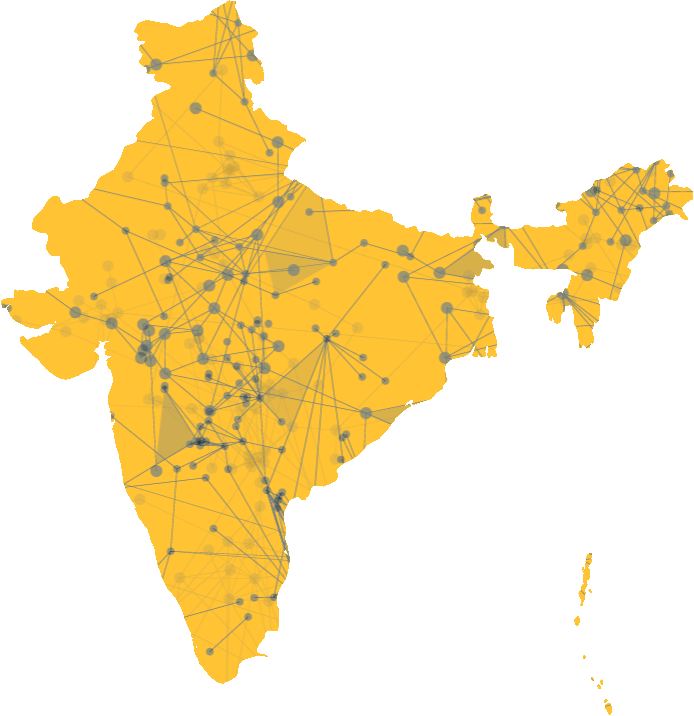RAISE VOICES
Ushahidi builds technology to help disadvantaged people raise their voice and get the help they need. The solutions we invent make Ushahidi a pathway to better communication between people who need help and those who can respond. Our technology solutions are designed and hosted as web-based applications that can be accessed through the Internet via a computer, smartphone or tablet. The applications work in low-bandwidth environments and have been tested with satellite data backhaul systems. Data can be collected in several ways – through social media, embeddable web forms, via SMS from any mobile phone, and a native application available on iOS and Android. This means people can use the Ushahidi platform to raise their voices no matter their technology constraints.
THERE ARE THOUSANDS OF EXAMPLES OF HOW USHAHIDI HAS BEEN USED TO HELP RAISE VOICES. THESE ARE JUST A FEW THAT SHOW THE IMPACT THIS TECHNOLOGY CAN HAVE AROUND THE WORLD.
ENSURING A FAIR ELECTION: HELPING KENYANS FEEL HEARD IN THE ELECTION PROCESS

After violence erupted in Kenya following the 2008 election, Ushahidi served as the technology provider for Uchaguzi, a joint initiative between SODNET, Ushahidi, CRECO and Hivos Foundation, with support from the Canadian International Development Agency (CIDA), for the 2010 referendum and an election in 2013. Creco and Infonet deployed the Ushahidi platform again for two elections in 2017.
Explore Uchaguzi8,000
Reports75%
of issuesresolved
“I reported everything that I saw going wrong, got responses from the emergency hotlines that you gave us to an extent of getting ambulances to rescue victims of stampedes at the polling stations. Thank you.”
Voter, Kenya 2013SINCE 2008
50 MILLION+
crowdsourced reports, posts, and testimonies gathered, triaged, and responded to
150,000+
deployments in 160 countries
10 MILLION+
alerts created and triggered to people on the ground, helping to keep them safe
INFORM DECISIONS
Often people know a problem exists, yet there is a lack of information to highlight the need for change. Organizations face roadblocks in obtaining first-hand accounts of an incident because people may be afraid or do not have the means to raise their voice. The Ushahidi platform is designed to reduce these barriers and empower people to come forward. This matters because when people are heard, organizations, governments and anyone in the position to help can make informed decisions. The Ushahidi platform manages crowdsourced data from multiple sources so whoever is administering the platform can find, search and see relevant information and export it however they like. This means first responders can pinpoint where people are trapped after an earthquake, for example, and authorities can see where there is corruption, unrest or security concerns to make better decisions on how to keep people safe.
THE USHAHIDI PLATFORM HAS SHED LIGHT ON PROBLEMS AROUND THE WORLD. HERE ARE JUST A FEW EXAMPLES OF HOW TECHNOLOGY CAN INFORM DECISIONS.
REPORTING ACTS OF CORRUPTION: CITIZENS DRAW THE RED LINE

Citizens in Macedonia raised their voices in 2012 using the Ushahidi platform. Transparency International – Macedonia and the Center for International Relations deployed an open source version of the Ushahidi platform to empower citizens to report on alleged acts of corruption. The project was called Draw the Red Line and enabled citizens to voice concerns through the website, smartphone applications, SMS and email. This version of the platform included features to ensure safeguards for citizens’ personal information and that vetted reports were identified for display on the site. The reports led to investigations on consumer electric charge violations, improper property taxes, and reports of abuse of workers’ rights. This is an example of how information can inform decisions so governments can take action.
Explore Transparency Watch121
reports that ledto investigations
37
ALLEGATIONSWERE VERIFIED
“PrijaviKorupcija is a joint project by Transparency International – Macedonia and the Center for International Relations allowing citizens to report cases of corruption via ONE (Mobile Operator) by sending SMS from their mobile phones, sending an email, using the web form, the hashtag #korupcijaMK on twitter or by reporting on the phone. Our website, PrijaviKorupcija.org, allows users to view reported cases on the site, categorized by reported case type.”
Transparency International Macedonia transparency-watch.org/Since 2008
18 MILLION+
people reached in critical situations
40+
languages Ushahidi software translated into
150 MILLION+
page views of Ushahidi deployments advocating for human rights through first hand testimonies
Stop Suffering
Ushahidi is not on the ground providing medical assistance to those who are hurt. We are also not decision makers who can change processes or policies. But we are building technology to give people in critical situations a way to ask for help. In the wake of a hurricane, political revolution, or earthquake, for example, it is difficult to collect real-time reports from people on the ground. Destruction is everyone and some areas may not be accessible at all. The Ushahidi platform has now been deployed in almost every crisis situation over the past ten years around the world. During crisis situations it is used to collect real-time reports of people buried under rubble, shortages of medical supplies and food, and changes to the environment. This information is also exported onto a map so emergency responders can direct resources to the right locations immediately.
HERE IS AN EXAMPLE OF HOW TECHNOLOGY CAN STOP SUFFERING AND SAVE LIVES BY PROVIDING REAL-TIME REPORTS OF PEOPLE IN NEED.
COLLECTING REPORTS FROM ON THE GROUND: RESPONDING TO EARTHQUAKE VICTIMS IN NEPAL

On April 25, 2015, a 7.8 magnitude earthquake devastated Nepal killing more than 9,000 people and injuring over 23,000 people. Much of the infrastructure around the country was severely damaged, leaving hundreds of thousands without shelter or basic necessities. Kathmandu Living Labs (KLL), an organization dedicated to the co-creation and implementation of mobile and internet-based technology solutions, used our Ushahidi platform to collect reports from the ground to help direct relief efforts. Since there were no formal channels for citizens to report urgent needs, the Nepalese Army directed the country to use the Ushahidi platform they called Quakemap. Agencies could see what was happening, what kind of relief was needed, where it was needed, and was even able to verify the reports to make sure aid was actually delivered.
Explore Quakemap2500+
INCIDENT REPORTSWERE TRIAGED
OVER THE
NEXT WEEK
700
HELICOPTERS DISPATCHEDTO RESCUE PEOPLE
THAT WEEK
“Crowd Sourcing is one of the common approaches to collect information from the public. Although it is not new in the context of disaster management, but during the earthquake in Nepal, this approach was appropriately used in a matured way. The systematic process defined by Kathmandu Living Labs volunteers marked a path in utilization of crowd sourced data by implementing agency like Nepalese Army.”
Nepalese Army ReportSINCE 2008
3.5 million+
citizen reports in crisis situations
3 million+
citizen reports in election, government transparency, and civic engagement
INFLUENCE CHANGE
Over the last 10 years, the Ushahidi platform has helped disadvantaged people raise their voice. We have seen technology build trust into the election system. We have seen governments take action due to reports of corruption and human rights violations. We have seen lives saved because technology has helped pinpoint accurate locations of people in need. When our Ushahidi platform is used, it collects information that tells a real-time story that brings global attention to humanitarian and development challenges. People use technology to be heard and this aggregation of voices can influence change.
USHAHIDI KNOWS IT IS SUCCESSFUL WHEN WE SEE CHANGE HAPPEN IN THIS WORLD, THANKS TO THE USE OF OUR TECHNOLOGY.
GIVING WOMEN A VOICE: MAKING CITIES SAFER FOR WOMEN

A rape occurs every 20 mins in India. Yet most women and girls do not talk about this abuse for a multiple of reasons – fear of society, culture, victim blaming, fear of police, tedious formal procedures etc. Women keep silent and this data is not captured anywhere so the problem is not visible to find effective solutions. This is why the Red Dot Foundation Group initiated its flagship program Safecity in India, and later Kenya, Cameroon and Nepal. Safecity uses the Ushahidi platform to crowdsource personal stories of sexual harassment and abuse in public spaces. This data can be anonymous and is aggregated as hot spots on a map indicating trends at a local level. This way the data can alert individuals, local communities and local administration to see the identify factors that causes behavior that leads to violence and work on strategies for solutions. Since its launch in 2012, over 10,000 stories from over 50 cities in India, Kenya, Cameroon and Nepal have been collected. Change is underway. Community leaders and neighbours are addressing these issues through local campaigns that have led to more street lights, awareness campaigns, women’s walking groups, and better city resources to protect women.
Explore Safecity10,000
REPORTS IN OVER50 CITIES
“If there are poor official statistics, the problem is not visible and is not a true representation of the actual problem. Therefore we need to break our silence and document every instance of harassment and abuse in public spaces so that we can find the most effective solutions at the neighborhood level.”
Elsa D’Silva, Founder, Safecity“I was able to get Safecity up and running in a few hours, without a technical background or team, because I could just use the Ushahidi platform.”
Elsa D’Silva, Founder, Safecity, Award speech at UN Solutions Summit 2016